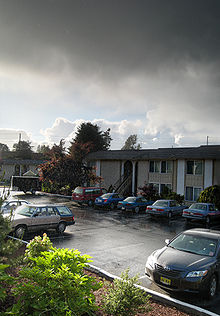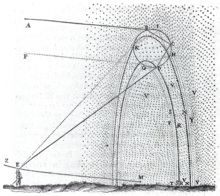- Sunshower
-
This article is about the meteorological phenomenon. For commercial products with the name "Sunshower", see Sunshower (commercial product). For the Thelma Houston album, see Sunshower (album). For the song, see Sunshowers.
A sunshower or sun shower is a meteorological phenomenon in which rain falls while the sun is shining.[1] These conditions often lead to the appearance of a rainbow, if the sun is at a low enough angle.[1] Although used in the United States, Canada, Australia, New Zealand, Ireland, and parts of Britain, the term "sunshower" is rarely found in dictionaries.[2] Additionally, the phenomenon has a wide range of sometimes remarkably similar folkloric names in cultures around the world.[3] A common theme is that of trickster animals, or the devil, getting married, although many variations of parts of this theme exist.[2][3]
Contents
Meteorology
The nature of cumuluform clouds is such that the sun can often be seen while they are producing rain.[1] If a sunshower occurs when the sun is low in the sky (specifically, any time the sun is at less than a 42° angle), a rainbow can occur.[citation needed]
Anecdotally, a sunshower is said to be a sign that rain will occur again soon, specifically that it will rain the next day.[1]
Folkloric names
Animals
- In South African English, a sunshower is referred to as a "monkey’s wedding", a loan translation of the Zulu umshado wezinkawu, a wedding for monkeys.[2] In Afrikaans, it is referred to as jakkalstrou,[2] jackals wedding, or also Jakkals trou met wolf se vrou as dit reën en die son skyn flou, meaning: "Jackal marries Wolf's wife when it rains and the sun shines faintly."
- In Hindi, it is also called "the foxes wedding".[2]
- In Konkani, it is called "a monkey's wedding".
- In Sinhala, it is called "the foxes wedding".
- In Bengali, it is called "a devil's wedding".
- In Brazil, people say "Rain and sun (chuva e sol), Snail's (caracol) wedding" OR "Sun and rain (sol e chuva), Widow's (viúva) marriage".
- In Arabic, the term is "the rats are getting married".[2]
- In Korea, a male tiger gets married to a fox.
- In Eritrea, the traditional belief is that the hyena is giving birth.
- In various African languages, leopards are getting married.
- In Kenya, hyenas are getting married.
- One animal, the fox, crops up all over the world[citation needed], from Kerala to Japan (Japan also refers to it as 'Kitsune (the fox) takes a bride') to Armenia; there’s even an English dialect term, "the foxes’ wedding", known from the south west of England. In Calabria, Italy, it is said: "When it rains with sun, the foxes are getting married.” In Finland, it is said "the foxes take their bath".
- In Bulgaria, there is a saying about the bear marrying.[2]
- In Tamil Nadu, South India, the Tamil speaking people say that the fox and the crow/raven are getting married.
- In Mazandarani language, in north of Iran, it is also called "the jackal’s wedding".
- In parts of the United Kingdom, it is referred to as "a monkey's birthday".
- In Pashto, it is also called "Da gidarh wade" or "the jackal's wedding".
- In Hawaii, it is known as "Ghost Rain".
- In El Salvador, the traditional belief is that the deer is giving birth.
Devils
In the United States, particularly the South, a sunshower is said to show that "the devil is beating his wife"; a regional variant from Tennessee is "the devil is kissing his wife".[4][5] In Canada, it's typically related to the devil beating his wife, then marrying numerous offspring; it is also said that he slaughters and rapes cattle, and then dances, which leads to rain.[citation needed] In French, the phrase is "Le diable bat sa femme et marie sa fille"[6] (i.e., "the devil is beating his wife and marrying his daughter"). In German, the variation is "Wenn's regnet und die Sonne scheint, so schlägt der Teufel seine Großmutter: er lacht und sie weint" (i.e., "When it's raining and the sun shines, the devil is beating his grandmother: he laughs and she cries"). The Hungarian "Az Ördög veri a feleségét" and the Piedmontese "Al diau al bat la fumna" also both translate as "the devil is beating his wife". The lower Caribbean variant is "The devil and his wife are fighting for a bone". The Brugarian variant is: "The devil has thrown over his wife for a fox." In the Netherlands people say "Het is kermis in de hel" (i.e., "There is a funfair in hell").[citation needed]
Witches
In Polish, the saying is that "when the sun is shining and the rain is raining, the witch is making butter". In Spain and the Dominican Republic, it is said a witch is getting married.
In dialects of north-eastern Italy (Veneto), a variation concerns "witches" and "combing": piova e sole, le strighe se pètena ("rain and sun, the witches are combing their hair"), piova e sole, la striga se fa le coe ("rain and sun, the witch is plaiting her hair"). A further variation is found in Catalan folklore, in a song: plou i fa sol, les bruixes es pentinen, plou i fa sol, les bruixes porten dol ("it rains and sun is shining, witches comb their hair, it rains and sun is shining, the witches are mourning").[citation needed]
Other variations
For Filipinos, "elves are getting married", or "tikbalang" (half-horse, half-men) and a "kapre" are getting married, while in Greece it is the poor.[citation needed]
In Lithuanian and Estonian (vaeslapse pisarad), the phenomenon is described as "orphans' tears", where the sun is the grandmother drying those tears. In Russian, it is called грибной дождь (gribnoy dozhd'), "mushroom rain", as such conditions are considered favorable to growing mushrooms.[7] It is also often referred to as слепой дождь (slepoy dozhd'}, which literally translates as "blind rain".[citation needed]
In Brazil a common rhyme is "Sol e chuva, casamento de viúva. Chuva e sol, casamento de espanhol", meaning: "Sun and rain, a widow's marriage. Rain and sun, a Spanish man's marriage."[citation needed]
See also
- April showers (weather phenomenon)
- Lake-effect snow
- Physical effects of climate change
References
- ^ a b c d Symonds, Steve, Weather Terms - Wild Weather, 2004, ABC North Coast, Retrieved November 2006.
- ^ a b c d e f g Quinion, Michael, Monkey's Wedding, 2001, World Wide Words, Retrieved November 2006
- ^ a b Vaux, Bert, Sunshower summary, 1998,linguistlist.org, retrieved November 2006
- ^ Sunshower at Word Detective. Accessed August 6, 2007.
- ^ Sunshower Devil Thread on Snopes.com. Accessed August 6, 2007.
- ^ Samson, D. N. (1920). English into French: Five Thousand English Locutions Rendered into Idiomatic French, London: Humphrey Milford at Oxford University Press (digital copy at Archive.org, OCLC 259775152), p. 102: "It rains and shines at the same time : Le diable bat sa femme et marie sa fille"
- ^ KPBS > KPBS Radio, 89.5 FM San Diego > A Way with Words
Bibliography
- Blust, Robert (1998) The Fox's Wedding. Manuscript, University of Hawaii.
- Evgen'jeva, A. P., ed. (1985-) Slovar' russkogo jazyka v 4 tomakh, 3rd edition. Moscow.
- Kuusi, Matti (1957) Regen bei Sonnenschein: Zur Weltgeschichte einer Redensart. "Folklore Fellows Communications" n. 171, Helsinki 1957 (it appeared translated into Italian in the journal "Quaderni di Semantica" 13 (1992) and 14 (1993)).
- Hoffmann-Krayer, E. (1930–31) Handwrterbuch des deutschen Aberglaubens. Berlin and Leipzig: Walter de Gruyter.
External links
- Languagehat
- Word-detective.com
- Google Answers on the origin of "fox's wedding day"
- The Wyandot Nation of Kansas - Myth on the origin of sunshowers
- Akira Kurasawa's film "Dreams" has a segment about a young boy witnessing a fox wedding procession during a sunshower.
Categories:
Wikimedia Foundation. 2010.



